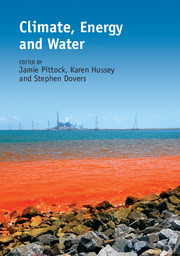Book contents
- Frontmatter
- Contents
- List of contributors
- Acknowledgements
- 1 Justifying, extending and applying “nexus” thinking in the quest for sustainable development
- 2 Water resources, climate change and energy
- 3 Implications of climate change for energy systems in a multisectoral context
- 4 Fossil fuels and water: A complex and evolving relationship
- 5 Renewable energy and water
- 6 Hydropower within the climate, energy and water nexus
- 7 Water and biofuels
- 8 Trade-offs and synergies between water and energy use in rural Australia
- 9 Management of the urban energy-water nexus
- 10 Managing the electricity-water nexus in China, France, India and the United States
- 11 Cross-sectoral governance of the climate, energy and water sectors: A ‘Rubik's cube’ analysis of cross-sectoral co-ordination
- 12 Regulation of the nexus
- 13 Climate, energy and water: the potential roles and limitations of markets
- 14 Strategies to mainstream climate change, energy, water and food security nexus knowledge and skills
- 15 A nexus of nexuses: systemic governance for climate response
- 16 Integrated modelling of the energy-water nexus in the American West
- 17 Biodiversity and the climate, energy and water nexus
- 18 Consumers, food supply chain and the nexus
- 19 Future prospects in climate, energy and water research and policy
- Index
1 - Justifying, extending and applying “nexus” thinking in the quest for sustainable development
Published online by Cambridge University Press: 05 April 2015
- Frontmatter
- Contents
- List of contributors
- Acknowledgements
- 1 Justifying, extending and applying “nexus” thinking in the quest for sustainable development
- 2 Water resources, climate change and energy
- 3 Implications of climate change for energy systems in a multisectoral context
- 4 Fossil fuels and water: A complex and evolving relationship
- 5 Renewable energy and water
- 6 Hydropower within the climate, energy and water nexus
- 7 Water and biofuels
- 8 Trade-offs and synergies between water and energy use in rural Australia
- 9 Management of the urban energy-water nexus
- 10 Managing the electricity-water nexus in China, France, India and the United States
- 11 Cross-sectoral governance of the climate, energy and water sectors: A ‘Rubik's cube’ analysis of cross-sectoral co-ordination
- 12 Regulation of the nexus
- 13 Climate, energy and water: the potential roles and limitations of markets
- 14 Strategies to mainstream climate change, energy, water and food security nexus knowledge and skills
- 15 A nexus of nexuses: systemic governance for climate response
- 16 Integrated modelling of the energy-water nexus in the American West
- 17 Biodiversity and the climate, energy and water nexus
- 18 Consumers, food supply chain and the nexus
- 19 Future prospects in climate, energy and water research and policy
- Index
Summary
Introduction
There was a time, not very long ago, when scholars, policy makers and those engaged in private enterprise were consumed by the quest for sustainable development. Gaining prominence after the 1987 Brundtland Report and subsequent UN-sponsored conferences, the concept of sustainable development demanded and received enormous attention over several decades, and in many ways, the achievements of those heady days are remarkable. For example, the key tenets of sustainable development – notably, the principles of precaution, policy integration, inter- and intra-generational equity, and the polluter pays principle – were incorporated into significant international law and into the domestic policies of almost every country on earth. The sense of urgency and import generated in that period also ushered in a suite of initiatives and instruments to support the process towards sustainable development, from ‘triple bottom line reporting’ and ‘corporate social responsibility’, through to the mainstreaming of environmental impact assessments and third-party certification of environmental practices. Not surprisingly, the momentum generated from the late 1980s onwards was matched by a concomitant rise in the representation of pro-environment parties in many countries, the establishment of national and state departments of the environment, and the proliferation of sustainability-related professions and associated educational offerings.
But somewhere along the way sustainable development – the ideological concept, process and goal – has almost disappeared from the international stage. Indeed, notwithstanding its rebadging to a green economy by UNEP, ‘green growth’ and the post-Rio+20 emergence of Sustainable Development Goals, it is fair to say that the global effort expended on ‘sustainable development’ has faded, replaced by similar levels of zeal and activity targeted at climate change. Why is that the case? Perhaps because the all-encompassing scope of ‘sustainable development’ made it unwieldy and intractable in practice? Or was it a consequence of the characteristic boredom that humanity exhibits when a concept lurks too long or is too difficult to achieve?
- Type
- Chapter
- Information
- Climate, Energy and Water , pp. 1 - 5Publisher: Cambridge University PressPrint publication year: 2015
- 3
- Cited by

